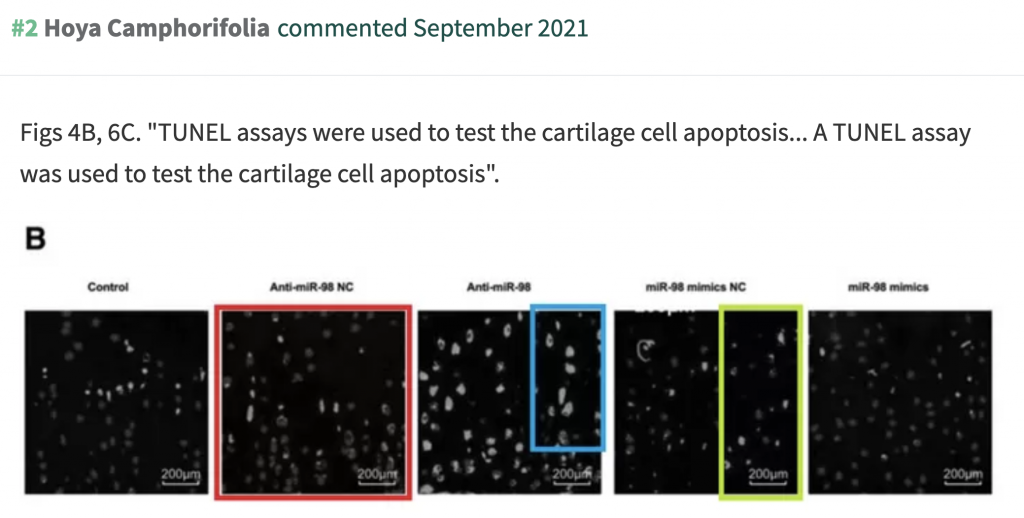
In 2016 Genetic Testing and Molecular Biomarkers published a paper on osteoarthritis by a group at Linyi People’s Hospital in China. Five years later, the authors contacted the journal asking for the correction of a pair of figures — but, as the publisher, Mary Ann Liebert, explained, the new files were “not workable.”
In May 2021, the journal issued an expression of concern for the paper (which, we’ll note, unfortunately sits behind a paywall). And earlier this month, it was retracted. For the rest of the story, read the retraction notice (caution, the following text might contain trigger words for unethical researchers):
Genetic Testing and Molecular Biomarkers officially retracts the paper entitled, “Upregulation of miR-98 Inhibits Apoptosis in Cartilage Cells in Osteoarthritis,” by Gui-Long Wang, Yu-Bo Wu, Jia-Tian Liu, and Cui-Yun Li (Genet Test Mol Biomarkers. 2016;20(11)645–653; doi: 10.1089/gtmb.2016.0011).
In May of 2021, the authors of the article requested a correction to two figures and supplied new files, but the files were not workable. Over the course of several weeks, the Publisher contacted the authors on multiple occasions requesting new files, however the authors never responded to any of the requests. It is unclear what the specific errors were and if correcting the images in the article would be sufficient enough to properly address the problems. Readers were advised of the original communication from the authors: “In this article, there are picture typesetting errors. Figure 1B Normal group images, Figure 4B Anti-miR-98 NC and Anti-miR-98 miR-98 mimics NC group images misused the images of other groups. We are sorry for this error caused by our carelessness.”
Four months after the publication of the Expression of Concern, further questions were raised via the PubPeer platform1 which led the Editor and Publisher to contact the corresponding author yet again, this time asking for the original raw data connected with their research for further evaluation. A response was not received.
The lack of the authors’ response in both instances, combined with the comments presented on PubPeer, have led to the conclusion that the paper was submitted from a paper mill. This is a violation of the journal’s standard protocols and is considered an infraction against the rigorous standards of scientific publishing.
The Editor and Publisher of Genetic Testing and Molecular Biomarkers are committed to preserving the scientific literature and the community it serves and does not tolerate any misconduct.
Li, the corresponding author, did not respond to a request for comment.
Heather Malloy, the senior manager for peer review operations at Mary Ann Liebert, told us:
We’re always working to improve our policies and procedures–and our communications. And there is always room for improvement. We have increased our surveillance and investigation procedures for potential misconduct and other ethics issues but, along with those initiatives, we know that it is important to clearly state the reasons for the retraction: As a statement of our intolerance for misconduct, to provide clear and transparent information to readers, and to protect the scientific record.
Susan Jensen, the director of production and editorial operations at Mary Ann Liebert, and the author of the stern notice, added:
As the publisher of 100+ peer reviewed journals, we want our readers – and our authors – to realize that we are a stalwart supporter of the fundamental protocols and rigors of scientific publishing, and that we continue to take an ever-increasing strong stance on protecting the scientific record. We do not – and will not – tolerate any form of scientific misconduct and will always be transparent with the reasons for retracting any published paper.
Like Retraction Watch? You can make a one-time tax-deductible contribution or a monthly tax-deductible donation to support our work, follow us on Twitter, like us on Facebook, add us to your RSS reader, or subscribe to our daily digest. If you find a retraction that’s not in our database, you can let us know here. For comments or feedback, email us at [email protected].
China and paper mills…. coincidence?
in this piece you write “In May 2021, the journal issued an expression of concern for the paper (which, we’ll note, unfortunately sits behind a paywall).”
Unfortunately, often your links are to stories behind paywalls or that require registration. The story on fibromyalgia in the same email as this story is an example. It is very annoying and I suggest you stop this practice.
Thanks for the feedback.
We note when retraction notices and expressions of concern are behind paywalls because that violates COPE guidelines: https://publicationethics.org/retraction-guidelines
We do frequently link to stories that are behind paywalls or require registration, because we understand that reporting takes resources, and that subscriptions and registrations are an important way that work is sustained. We think it is important to support that work. Restricting our pool of links to those that do not require such measures would make for a poor — and some would argue, skewed — reader experience. We also note that books are not generally free, for the same reason.
It is as if the publisher is trying to make up for the minimal, uninformative Retraction notes that are popular elsewhere.
China should really have a revolution for its promotion system for the doctors working in the hospital. So many doctors working in the hospital or even ER are required to publish papers to get a promotion and a raise for their salary, but the reality is that they are super busy with their patients 10 hours per day and they really don’t have time to write papers.
Therefore, they kinda hire the paper mill service to help them publish papers. I am not saying the doctors are doing right, but since a huge amount of paper mill scandals happened every year, China should reconsider its promotion system. Are the doctors who hire paper mill should take the full blame??